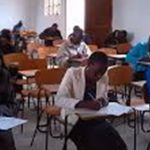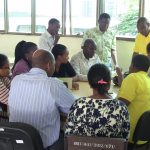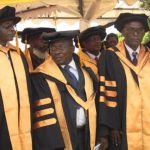Bachelor Of Arts In Sociology
The programme is designed basing on the needs of the society (Africa and Tanzania in particular) to have many sociologists to solve severe social problems having been faced.
These include the Family conflict and Gender based violence, social inequality, deviance, human trafficking, globalization, HIV/AIDS, Drug abuse, Street Children, homelessness, food insecurity, rampant unemployment which are affecting the society.
These emerging issues have created concern in the public on the need to have trained sociologists to help the society to identify the root causes of and to provide solutions for these problems.
Furthermore, the programme provides opportunities for students and those in employment in the field related to sociology as well as those who are not in formal employment to enroll for the courses, thus enabling many students to study in the degree programme and increase output of sociologists.
Programme Summary
Programme Informations
Option (I): Direct Entry Scheme (Form VI) Qualifications
- Possession of Certificate of Secondary Education Examination (CSEE) or equivalent, with credit passes in five approved subjects, obtained prior to sitting for the Advanced Certificate of Secondary Education Examination (ACSEE) or equivalent; and
- He/she has obtained at least two principal level passes in approved subjects in the Advanced Certificate of Secondary Education Examination (ACSEE); and
- Option (II) Equivalent Qualifications
Diploma in Sociology, Social work, Environmental Health Sciences, Clinical Medicine, Criminal Investigation, Mass Communication, Media production, Records management, Journalism, Accountancy, Law, Banking and finance, Community Development, Customs and tax Administration, Development and Administration and Management, Development planning, Information Technology, Public administration, Animal Health, Marketing and Public Relations, Industrial Relations, Secretarial studies, Procurement and Logistic, General Agriculture, Counseling and Psychology, Education, Human Resource, Youth Development Work (CYP), Library and Information Management, Foundation programme any other Diploma, Diploma recognized by OUT Senate with an average of ‘B’ or GPA of 3.0 with not less than four passes at O’ Level.
Table 2: Courses Taken by Sociology Students
- Level One
Course Code | Course Title | Core/Elective | Units |
OSS 121 | Introduction to Sociology | Core | 2 |
OSS 122 | Introduction to Social Science Research Methods | Core | 2 |
OSS 123 | Classical Sociological Theory | Core | 2 |
OSS 124 | Introduction to social Psychology | Core | 2 |
OSS 125 | Critical thinking and argumentation | Core | 2 |
OCP 100 | Introduction to computer | Core | 1 |
OFC 017 | Communication skills | Core | 1 |
Total |
|
| 12 |
NOTE:
After successful completion of all core courses in level I above, a student will be allowed to choose a specialization from options A, B or C. However, while doing a specialization course of one’s choice, in level II and III, students MUST also do compulsory courses in levels 11 and level III respectively. See table below on guide to units for BASO students.
- Level Two
Course Codes | Course Title | Units | Core/Elective |
OSS 221 | Contemporary Sociological Theory | Core | 2 |
OSS 222 | Social Science Research Methods | Core | 2 |
OSS 223 a | Field Practice I | Core | 1 |
TOTAL |
|
| 5 |
- Level Three
Course Codes | Course Title | Units | Core/Elective |
OSS 321 | Sociology of knowledge | Core | 2 |
OSS 322 | Poverty, wealth and inequality | Core | 2 |
OSS 323 | Globalization and social problems | Core | 2 |
OSS 223 b | Field practice II | Core | 1 |
TOTAL |
|
| 7 |
a: General Fees for Bachelor Degree Programmes
No | Item | Local (Tsh) | EAC/SADC (USD) | Non-SADC/EAC (USD) |
1 | Registration Fees | 30,000 | 30 | 30 |
2 | Examination fees paid per paper (Test & Exam) | 10,000 | 20 | 40 |
3 | Student Organization fees (annually) | 20,000 | 20 | 20 |
4 | Student Identity card | 20,000 | 20 | 20 |
5 | Quality Assurance Fee (annually) | 20,000 | 20 | 40 |
b: Tuition Fees per Unit (or per 10 credits) for Bachelor Degree Programmes
S/N | Item | Local (TSh) | EAC/SADC (USD) | Non-SADC (USD) |
1 | Theoretical course by distance mode | 40,000 | 40 | 80 |
2 | Field Practice | 100,000 | 70 | 140 |
3 | Project/dissertation | 100,000 | 70 | 140 |
| SN | NAME | PROGRAM | MOBILE NO | |
| 1. | Straton R. Kakoko | BASO | 0715030242 | straton.ruhinda@out.ac.tz |
The programme provides opportunities for students and those in employment in the field related to sociology as well as those who are not in formal employment to enroll for the courses, thus enabling many students to study in the degree programme and increase output of sociologists.
This course is intended to provide prerequisite requirements for those aspiring to pursue Master Degree in Sociology and or enrich their career options.
All Bachelor of sociology courses shall be examined during the academic year in which they are studied. The assessment will comprise course work and annual examinations. Course work assessment shall consist of an online coursework assessment and a two hour written test. The coursework assessment will contribute 30% of the total marks for each course. Annual examinations; each student shall be required to sit for a three-hour annual examination, at the end of the academic year.
The annual examination will contribute 70% to the total mark of each course. The combination of both coursework and annual examination shall be100%. Each candidate shall be required to register for the examinations in specific subjects at least one month at latest, before the commencement of annual examinations period.
The annual University examinations shall be conducted under the control of the Deputy Vice-Chancellor (Academic) with the Director of the Examinations Syndicate.



